Related Research Articles
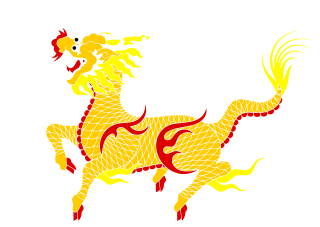
The qilin is a legendary hooved chimerical creature that appears in Chinese mythology, and is said to appear with the imminent arrival or passing of a sage or illustrious ruler. Qilin are a specific type of the lin mythological family of one-horned beasts. The qilin also appears in the mythologies of other cultures, such as Japanese and Korean mythology, where it is known as the kirin, and Vietnamese mythology, where it is known as the kỳ lân.
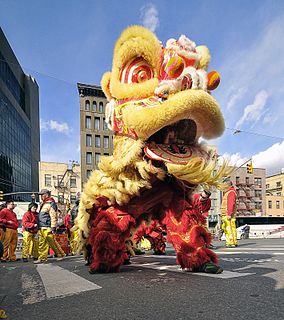
Lion dance is a form of traditional dance in Chinese culture and other Asian countries in which performers mimic a lion's movements in a lion costume to bring good luck and fortune. The lion dance is usually performed during the Chinese New Year and other Chinese traditional, cultural and religious festivals. It may also be performed at important occasions such as business opening events, special celebrations or wedding ceremonies, or may be used to honour special guests by the Chinese communities.
Zhong Gong (中功) is a spiritual movement based on qigong founded in 1987 by Zhang Hongbao. The full name (中华养生益智功) translates to "China Health Care and Wisdom Enhancement Practice." The system distinguished itself from other forms of qigong by its strong emphasis on commercialisation, and a targeted strategy that aimed to build a national commercial organisation in China in the 1990s.
Guo Degang is a Chinese crosstalk (xiangsheng) comedian and actor. Guo's film appearances include The 601st Phone Call, Just Another Pandora's Box, and Mystery. Guo has also directed the films Our Happiness and The Faces of My Gene.

Zhou Xinfang, also known by his stage name Qilin Tong was a Chinese actor and musician. He was a Peking opera actor who specialized in its "old male" roles. He is considered one of the greatest grand masters of Peking Opera of the 20th century, and the best known and leading member of the Shanghai school of Peking opera. He was the first director of Shanghai Peking Opera Company.

The X-Family is a Taiwanese drama starring Pauline Lan, Jiro Wang, Danson Tang, Sunnie Huang, Calvin Chen, and Aaron Yan. It is the sequel to the 2005 drama KO One and is produced by Comic International Productions. The series started filming in June 2006 and wrapped in April 2007. It was broadcast on cable TV Gala Television (GTV) Variety Show/CH 28 (八大綜合台) on August 8, 2007, to October 23, 2007.
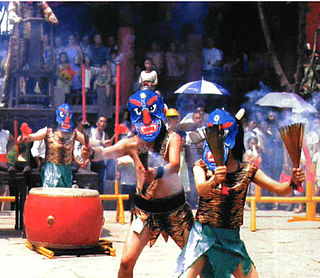
Nuo opera or Nuo drama is one of China's most popular folk operas. Characterized by its special features such as ferocious masks, unique dresses and adornments, the strange language used in performance, and mysterious scenes, Nuo opera has been selected as one of the non-material cultural legacies of China. The opera is a religious performance intrinsic to the culture of Nuoism, a type of Chinese folk religion. The purpose of Nuo opera is to drive away devils, disease and evil influences, and also to petition for blessings from the gods. Singing and dancing are included in Nuo opera and performers wear costumes and masks.

Dance in China is a highly varied art form, consisting of many modern and traditional dance genres. The dances cover a wide range, from folk dances to performances in opera and ballet, and may be used in public celebrations, rituals and ceremonies. There are also 56 officially recognized ethnic groups in China, and each ethnic minority group in China also has its own folk dances. Outside of China, the best known Chinese dances today are the Dragon dance and the Lion dance.
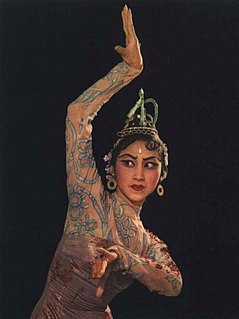
Chen Ailian was a Chinese dancer.
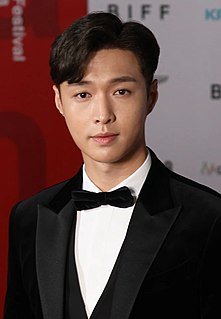
Zhang Yixing , known professionally as Lay Zhang or simply Lay, is a Chinese singer, songwriter, dancer, actor, and businessman. Zhang first gained recognition for participating in the Chinese television talent show Star Academy in 2005. He later debuted as a member of the K-pop boy group Exo and its Chinese sub-unit Exo-M under SM Entertainment in 2012.
The Central Military Commission Political Work Department Song and Dance Troupe, formerly known as Chinese People's Liberation Army General Political Department Song and Dance Troupe, is the official army choir of the Central Military Commission. Founded during the Chinese Civil War, the troupe consists of a song and dance ensemble, an opera troupe, and a repertory theatre.

Dance in China has a long recorded history. Depictions of dancing in China appeared over 4,000 years ago. The early dances may be folk dances or ritual dances, some of which developed into court dances. The most important of the early dances served important ritual and ceremonial roles and are known as yayue which continued to be performed at the imperial court until the Qing dynasty. A profusion of dances in popular and court entertainment as well as folk dances have been recorded in ancient texts. The art of dance in China reached a peak during the Tang dynasty when numerous dances were recorded. Dancing as an individual art form declined in the later eras when dances become incorporated into operas and female dancing also declined when footbinding became more prevalent. In more recent times dance has enjoyed a resurgence, and it is widely performed by the public and professionals alike.
A Dream of Red Mansions is a Chinese serial feature film produced by Beijing Film Studio, released in 6 parts between 1988 and 1989. Directed by Xie Tieli (谢铁骊) and Zhao Yuan (赵元), it is a cinematic adaptation of the 18th-century Chinese novel of the same name. The film took two years to prepare and three years to shoot, and remains, at 735 minutes, the longest ever made in the People's Republic of China.

Zhang Ruoyun is a Chinese actor. He graduated from the Beijing Film Academy in 2007.

The King's Woman is a 2017 Chinese television series starring Dilraba Dilmurat and Vin Zhang. It is adapted from the novel The Legend of Qin: Li Ji Story (秦时明月之丽姬传). The series aired on Zhejiang TV every Monday to Wednesday, from 14 August to 4 October 2017.
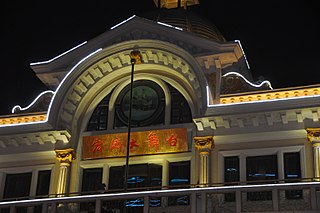
Hongji Grand Stage is the Beijing Opera house located in downtown Dalian, Liaoning, China.
Cheng Changgeng was a Qing dynasty Hui opera and Peking opera artist based in Beijing, who specialized in laosheng roles, or old gentlemen. Sometimes called the "Father of Peking Opera", he was the leader of the Three Celebrations Company (三慶班) as well as the leader of the actor's guild in Beijing. He was from Qianshan, Anhui.
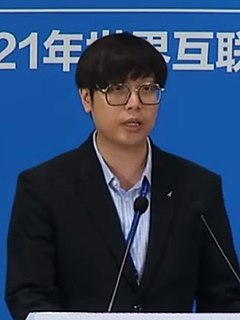
Fu Yu, known professionally as Wuheqilin is a Chinese illustrator and political cartoonist. His hometown is Harbin. He claims himself as a "Wolf warrior painter" and is famous in China for his artwork Peace Force, which depicts an Australian soldier killing an Afghan teenager.
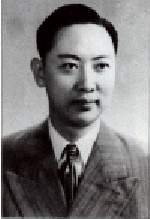
Zhang Junqiu was a singer of Peking Opera. He played a female, or dan role. His hometown was Dantu, Jiangsu, and he was born in Beijing. His vocal style is called "Zhang pai." It became popular in the 1970s and it is now the most widespread genre of Peking Opera. He was once one of the "four small famous dans." He is far better remembered than the other three.
Guo Qilin is an actor and a crosstalk (Xiangsheng) performer. Xiangsheng (相声), also known as crosstalk, is a traditional art form that was originally used for selling things on the street. Then it developed into a stage performance that intends to make audiences laugh. Guo Qilin is famous for his appearances in Deyunshe crosstalk performances and the TV series My Heroic Husband. He was awarded Best Actor at the 13th Macau International Festival. His debut drama The Story of Niu Tianci built a strong fanbase for him, and he won the New Actor of the Year in the 2021 One Drama Awards.